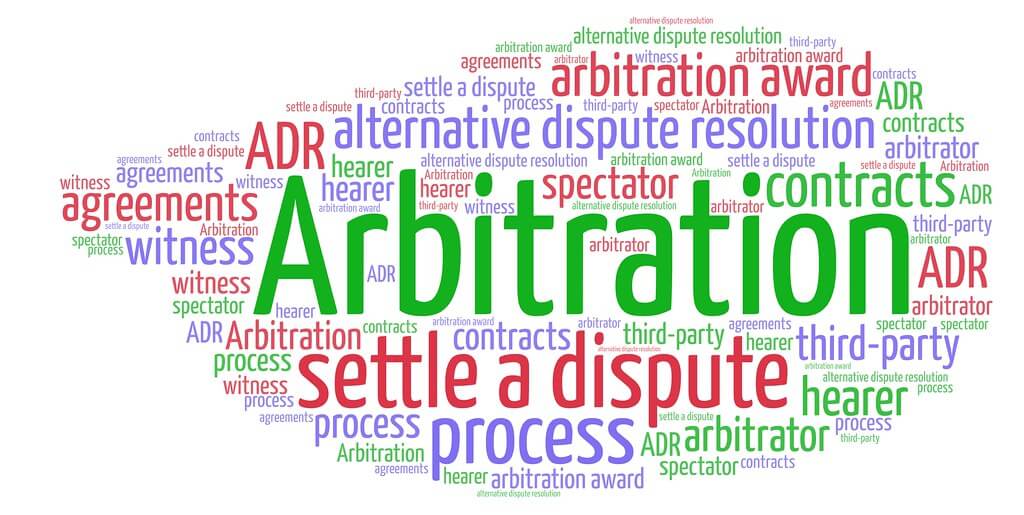Introduction
Alternative Dispute Resolution (ADR) and litigation can be referred to as two peas in a pod in the world of law and justice. Though both the procedures share common goal i.e. resolution of disputes, the process to reach such a goal is very different. The dictionary meaning of the term ‘litigation’ is the process, act, procedure to describe the settlement of disputes in a court of law. Arbitration law in India is one of the most commonly used forms of Alternate Dispute Resolution. The term ‘Alternative Dispute Resolution (ADR)’ means resolving disputes among two or more parties outside the courtroom. ADR includes Arbitration law in India, Mediation and Conciliation.
In order to understand the difference between the processes of both the procedure an illustration needs to be used:
Illustration: A and B entered into a loan agreement where A promised B to pay the principal loan amount along with interest on instalments basis. The agreement also had an arbitration clause which explained all the necessary grounds such as arbitration, what laws or rules shall be applicable, jurisdiction etc. A violates the terms of the agreement and fails to pay the principal amount and interest. B invokes the arbitration clause of the agreement.
As the arbitral clause has been invoked, therefore B may send a legal notice to the defaulter, i.e. A, to avoid initiating the arbitral proceeding. In case the defaulter fails to comply with the said notice then B may refer the matter to the arbitrator by way of a letter through its Authorized Representative/Advocate as per Section 10 of the Arbitration & Conciliation Act, 1996. The party has the liberty to appoint a number of arbitrators but it must be an odd number, in case no such thing is mentioned or the party fails to appoint an odd number of arbitrators then a sole arbitrator will be appointed. The Arbitrator then gives the consent to be the arbitrator for the adjudication of the disputes referred to him. The so appointed arbitrator then sends out the notice under section 21 of the Act, where the details of the appointment, the next date and time of arbitration proceeding along with the details of the place where the proceedings will be held is mentioned. Moreover, the arbitrator may even direct the parties to file their respective statement of claim and defence etc. The Statement of claim is filed by the one who has invoked the clause/claimant and Statement of defence by the other party/defendant. In case the defendant has any conflict regarding the appointment of the arbitrator then the other party may file a written statement of the reasons for challenging the arbitral tribunal within 15 days after becoming aware of the appointment of the arbitrator but the reason for the challenge must fall within the categories as mentioned in clause 3 of Section 12 of the Act. If no challenge is received then the parties have to file their respective pleadings, in case the claimant fails to file their Statement of Claim the proceeding will be terminated by the tribunal. In case the defendant fails to file the statement of defence even after sufficient opportunities the arbitrator has the power to proceed the matter with the ex-parte and pass the award accordingly. In case the pleadings are filed by the parties then the arbitrator shall decide whether to hold the proceeding for oral hearings for the presentation of evidence or for oral arguments or for proceeding based on the submitted documents and statement. And after the conclusion of the argument, the arbitral tribunal will pass an award in favour of such party that deems just and fit the tribunal.
In case, if there was no agreement or if the arbitration clause was missing from the agreement the party will have no other option but to resolve the disputes through mediation, litigation or court-referred mediation once the case is admitted in court. In case of litigation, the party may file a recovery suit under Order XXXVII of CPC 1908 or if the amount exceeds three lacs then the suit will become a commercial suit and will be adjudicated as per the Commercial Courts Act, 2015.
Difference between Arbitration and Litigation:
- All disputes which can be decided by a civil court that involves private rights, could be referred to arbitration. Thus, disputes about property or money, or about the amount of damages payable for breach of contract etc., can be referred to arbitration.
Litigation involves all sorts of disputes whether civil or criminal, in other words, all cases/disputes can be adjudicated by way of litigation but only specific categories of cases/disputes can be referred for arbitration.
- Arbitration is a quick, easy, inexpensive and hassle-free way for the resolution of disputes.
Litigation is a slow-going, complicated and expensive way for the resolution of disputes.
- Generally, the Arbitrators who hold the proceeding are retired judges of court but it is not mandatory to be a retired judge to become an arbitrator. There are no specific qualifications to become an arbitrator under the Indian Law. Every person who is of age and of sound mind can be appointed as an arbitrator. Arbitral institutions include in their panel a wide range of experts drawn from various professions, trade and business.
In litigation, the judges hold the proceedings that have cleared the Judicial Services and are the acting judicial officer of the court.
- The proceedings generally take almost half time as compared to litigation proceedings.
In litigation, as the judge holds proceedings of several cases in one sitting and each case needs just and proper adjudication therefore it is a slow process and thus the burden of pendency is high.
- The arbitrator charges fees for each sitting for the adjudication of the disputes.
In litigation, court fees need to be paid only once at the time of filing of the plaint.
- In arbitration, the place of the proceeding can be decided mutually if the jurisdiction is mentioned in the agreement.
In litigation the place is fixed as the case will be adjudicated where the territorial and the pecuniary jurisdiction of the court lies.
Importance of Arbitration
- Arbitration is one of the most trusted and commonly used forms of dispute resolution. The term ‘Alternative Dispute Resolution (ADR)’ means resolving of disputes among two or more parties outside the courtroom and Arbitration is one of the processes used for the purpose of quick, easy, inexpensive and hassle-free resolution of disputes. ADR also includes other means as well, such as conciliation, mediation, negotiation etc. The difference between other types of ADR and arbitration is that arbitration is binding upon the parties involved. An arbitral tribunal holds the power similar to that of a court.
- Arbitration is a cheap, flexible, uncomplicated and an informal way for settlement of disputes.
- The increasing popularity of Arbitration over litigation as a method of effective and efficient way for adjudication of dispute can be accredited to many reasons, one of the main reasons being the privacy and confidentiality the method entails. Though used interchangeably, ‘Privacy’ means that no third party can attend arbitral conferences and hearings, ‘Confidentiality’ refers to non-disclosure of specific information in public.
- The Arbitration and Conciliation Act 1996 has no provision for confidentiality in arbitral proceedings, but the Amendment Act of 2018 has the confidentiality clause. The Amendment act states that all details of arbitration proceedings will be kept confidential except for the details of the arbitral award in certain circumstances. Disclosure of the arbitral award will only be made where it is deemed to be necessary for implementing or enforcing the award.
- The arbitration proceeding is well known for its speedy conclusion. Moreover, the dates and timings of the proceeding are set as per the convenience of the parties and the arbitrator and at any place.
- The tribunal is not concerned with the technical way of proceeding as long as it follows the principle of fair hearing.
ConclusionIn conclusion, it can very well be said that Arbitration and litigation are the two most important forms of adjudication. Arbitration and litigation may have cut out from the same piece of cloth but both functions very differently despite having a common goal. Although arbitration and litigation have their pros and cons, arbitration proceeding outweighs litigation without an iota of doubt.





